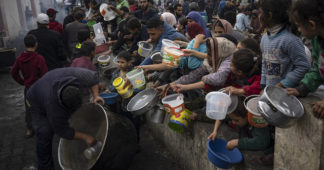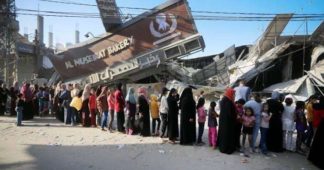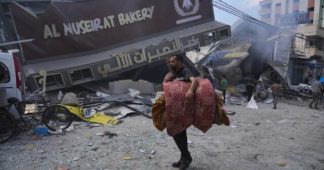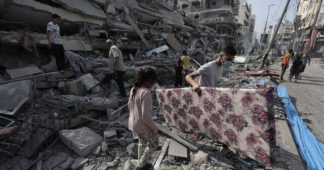May 6, 2025
Israel continues to operate with impunity in what seems to be a brutal and protracted experiment, while much of the world looks on, says RAMZY BAROUD*
THE situation in Gaza today starkly highlights Israeli exceptionalism. Israel is employing the starvation of two million Palestinians in the blockaded and devastated Gaza Strip as a tactic to extract political concessions from Palestinian groups operating there.
On April 23, the United Nations Office for the Co-ordination of Humanitarian Affairs (OCHA) described the current humanitarian situation in Gaza as “the worst ever seen throughout the war.” Despite the severity of these pronouncements, they often appear to be treated as routine news, eliciting little concrete action or substantive discussion.
Israeli violations of international and humanitarian laws regarding its occupation of Palestine are well-established facts. A new dimension of exceptionalism is emerging, reflected in Israel’s ability to deliberately starve an entire population for an extended period, with some even defending this approach.
The Gaza population continues to endure immense suffering, having experienced the loss of approximately 10 per cent of its overall numbers due to deaths, disappearances and injuries. They are confined to a small, largely destroyed area of about 365 square kilometres, facing deaths from treatable diseases and lacking access to essential services, and even clean water.
Despite these conditions, Israel continues to operate with impunity in what seems to be a brutal and protracted experiment, while much of the world observes with varying degrees of anger, helplessness or total disregard.
The question of the international community’s role remains central. While enforcing international law is one aspect, exerting the necessary pressure to allow a population facing starvation access to basic necessities like food and water, is another. For the people of Gaza, even these fundamental needs now seem unattainable after decades of diminished expectations.
During public hearings in The Hague starting on April 28, representatives from many nations appealed to the International Court of Justice to use its authority as the highest court to mandate that Israel cease the starvation of Palestinians.
Israel “may not collectively punish the protected Palestinian people,” stated the South African representative, Jaymion Hendricks. The Saudi envoy, Mohammed Saud Alnasser, added that Israel had transformed the Gaza Strip into an “unlivable pile of rubble, while killing thousands of innocent and vulnerable people.”
Representatives from China, Egypt, Algeria, South Africa and other nations echoed these sentiments, aligning with the assessment of Philippe Lazzarini, head of UNRWA, who stated, last March, that Israel is employing a strategy of “weaponisation of humanitarian aid.”
However, the assertion that the weaponisation of food is a deliberate Israeli tactic requires no external proof; Israel itself declared it. The then Israeli defence minister, Yoav Gallant, publicly announced a “complete siege” on Gaza on October 9 2023, just two days after the start of the genocidal war.
Gallant’s statement — “We are imposing a complete siege on [Gaza]. No electricity, no food, no water, no fuel — everything is closed. We are fighting human animals and we act accordingly” — was not an impulsive outburst but a policy rooted in dehumanising rhetoric and implemented with extreme violence.
This “acting accordingly” extended beyond closing border crossings and obstructing aid deliveries. Even when aid was permitted, Israeli forces targeted desperate civilians, including children, who gathered to receive supplies, bombing them along with the aid trucks. A particularly devastating incident occurred on February 29 2024, in Gaza City, where reports indicated that Israeli fire killed 112 Palestinians and injured 750 more.
This event was the first of what became known as the “Flour Massacres.” Subsequent similar incidents took place, and, in between these events, Israel continued to bomb bakeries, aid storage facilities and aid distribution volunteers. The intention was to starve Palestinians to a degree that would allow for coercive bargaining and potentially lead to the ethnic cleansing of the population.
On April 1, an incident occurred where an Israeli military drone struck a convoy of the World Central Kitchen, resulting in the deaths of six international aid workers and their Palestinian driver. This event led to a significant departure of the remaining international aid workers from Gaza.
*Dr Ramzy Baroud is a journalist, author and the editor of The Palestine Chronicle. He is the author of six books. His latest book, co-edited with Ilan Pappe, is ‘Our Vision for Liberation: Engaged Palestinian Leaders and Intellectuals Speak Out.
CONTINUE READING AT morningstaronline.co.uk
We remind our readers that publication of articles on our site does not mean that we agree with what is written. Our policy is to publish anything which we consider of interest, so as to assist our readers in forming their opinions. Sometimes we even publish articles with which we totally disagree, since we believe it is important for our readers to be informed on as wide a spectrum of views as possible.











